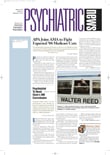All that has been known about kleptomania has come primarily from isolated case reports or studies of a small number of cases. After all, the condition is probably rare, and those who have it may be reluctant to seek treatment since their behavior is illegal.
Now, however, some French and Lebanese researchers have not only studied a handful of kleptomania subjects, but have compared them with subjects with some other kinds of disorders to gain a better understanding of the disorder.
And as the investigators reported in the August American Journal of Psychiatry, individuals who engage in pathological stealing do not seem to be driven by obsessions or compulsions or by a need to abuse substances, as some have theorized. They may, however, be motivated by anxiety and depression or by sensation-seeking, and especially by impulsivity. Impulsivity is “the major psychopathological feature of kleptomania,” they asserted in their report.
Franck Bayle, M.D., of the Centre Hospitalier Sainte-Anne in Paris and his colleagues recruited 10 individuals with kleptomania over a two-year period. To serve as comparison subjects, researchers also recruited 29 psychiatric patients without any impulsive-control disorder or substance-related disorder and 60 patients with alcohol abuse or dependence .
The researchers noted that most of the kleptomania subjects were women; the average age of onset of kleptomania had been age 30, with an average duration of illness of six years; all subjects had reached a university academic level.
Neurological examinations were normal. Only one of the subjects had had obsessive-compulsive disorder or tics, and only one had an alcohol-abuse problem. However, a number had mood disorders, other impulse-control disorders (for example, trichotillomania), and/or substance abuse or dependence (mainly nicotine addiction).
The onset of kleptomania varied for the subjects. It started one year after the onset of bulimia for two; several years after the onset of compulsive buying for two others; and alternated over time with a mood disorder for six.
The researchers then used the Schedule for Affective Disorders and Schizophrenia-Lifetime Version Modified for the Study of Anxiety Disorders and the Minnesota Impulsive Disorder Interview to assess all of their 99 subjects for anxiety and depression, sensation seeking, and impulsivity.
The investigators then compared the results for the kleptomania subjects with those for the subjects with other kinds of psychiatric disorders and to the results for subjects with alcohol abuse or dependence.
The researchers could find no statistically significant differences between the kleptomania subjects and the other two groups as far as anxiety and depression were concerned.
However, they did find that the kleptomania subjects and the alcohol-abusing subjects had significantly higher scores on sensation seeking than did the subjects with other kinds of psychiatric disorders. And they found that the kleptomania subjects had significantly higher impulsiveness scores than the other two groups.
These findings suggest that individuals with kleptomania are not driven to engage in it because of obsessions or compulsions or because of a need to abuse substances. However, they may be propelled toward it to some degree because of anxiety and depression and because of a need for thrills, but most of all because of their impulsivity.
In fact, “because kleptomania is characterized by a low rate of comorbid substance-related disorders other than nicotine dependence and by severe psychopathology, it could be an appropriate disorder in which to study the information processes and psychobiology underlying impulsivity,” Bayle and his team suggested in their study report.
Am J Psychiatry 2003 160 1509
